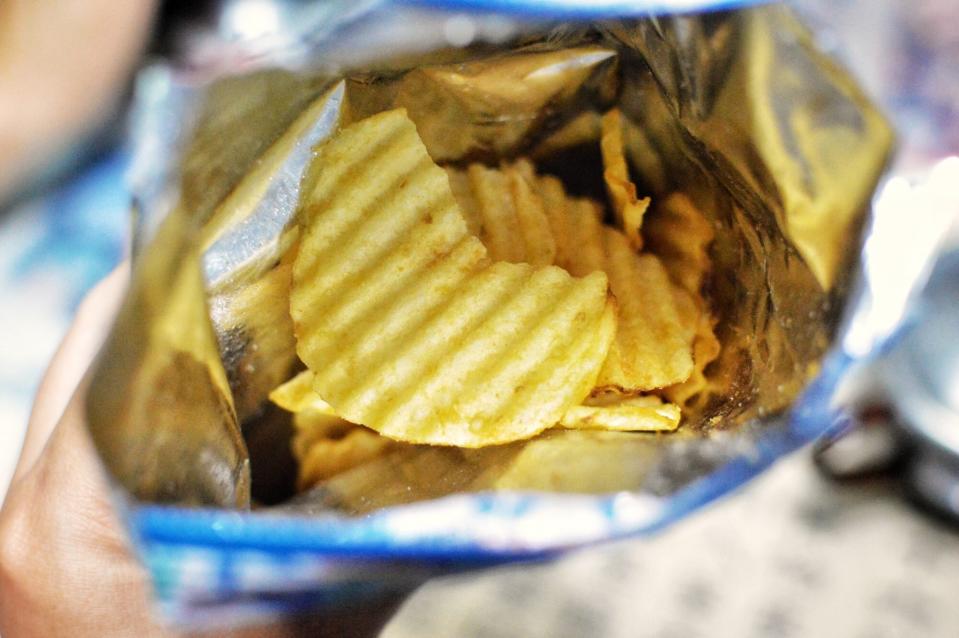Frito-Lay Workers Go on Strike with Some Claiming They Face 84-Hour Work Weeks
Imagine a world without Doritos, Cheetos, Fritos, and Tostitos. A world without Lay's potato chips, Sun Chips, and more. Frito-Lay products are ubiquitous across the country — and workers at one of the brand's largest manufacturing facilities are hoping that halting production on these snacks will give them the leverage they need to receive the pay and benefits they believe they deserve.
Last Monday, around 600 employees (reportedly about 80 percent of the full-time workforce) went on strike at the Frito-Lay plant in Topeka, Kansas — one of more than 30 manufacturing plants the company operates in the United States. Brad Schmidt — vice president for the Midwest region for the Bakery, Confectionery, Tobacco Workers and Grain Millers which represents the workers — told The Wichita Eagle that the union was striking for better pay, better working conditions, and less mandatory overtime.

Irina Marwan/Getty Images
The overtime issue seems to be especially contentious. Mark McCarter, who works at the plant, told the Topeka Capital-Journal that Frito-Lay often has employees working 12 hours per day, seven days a week — apparently with as little as eight hours of break time in between shifts. In an opinion piece published by the paper, Cherie Renfro backed up this assertion, piling on plenty of claims of her own, including this shocking allegation: "When a co-worker collapsed and died, you had us move the body and put in another co-worker to keep the line going," she wrote.
Renfro also stated that one classification of worker in the plant had seen its wages increase by just 20 cents per hour over the past decade. Monk Drapeaux-Stewart — a box drop technician — told the site Labor Notes that his wages are up just 77 cents over the past 12 years. "Milk's gone up. Meat has gone up. Everything has gone up," Tracy Johnson, a 30-year Frito-Lay veteran, told the Kansas News Service. "But our wages have stayed the same."
But Frito-Lay appeared ready to stand its ground, suggesting that after nine months of negotiations, they believed they had already come to a deal before union members ultimately voted against it on July 3. In an emailed statement, Frito-Lay stated, "While the union has suggested that Frito-Lay didn't meet its terms, Frito-Lay had agreed to the union's proposed economic terms," explaining that "each member of the union negotiating committee, including the union president, individually committed to supporting the agreement and encouraging Frito-Lay employees to vote in favor of ratifying it."
Frito-Lay continued, "That the union membership rejected this fully recommended agreement suggests union leadership is out of touch with the sentiments of Frito-Lay employees. Because the union had fully recommended our tentative agreement, we do not anticipate any further negotiations with the union for the foreseeable future… Frito-Lay will be focused on continuing to run the operations of our plant in Topeka and has a contingency plan in place to ensure employee safety. We will continue to be attentive to the situation and welcome any employees who wish to continue to work as they are legally entitled to do so."
Let’s keep it up! #UnionYes https://t.co/JRkUu6drm5 pic.twitter.com/1FuI1qXBKx
— Brent Welder (@BrentWelder) July 10, 2021
Now, with one week already in the books, this strike is worth monitoring as it appears as though it will continue to drag on. Calls have been made to boycott not just Frito-Lay products, but products from their parent company, PepsiCo, until the strike is resolved. And though the authenticity of the image hasn't been confirmed, a Kansas City area attorney shared a photo on Twitter of a sign stating that a store was "out of some Frito Lay product" due to "labor issues at the Topeka Frito Lay plant."

